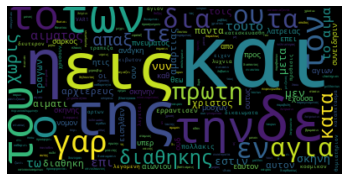The version used is ESV
Titles for God
- Father -God:14,20,24;
- Son - Mediator of new covenant: 15; Christ:11,14,24,28
- Spirit of Yah -Holy Spirit: 8; Eternal Spirit: 14
Actions of Yah
Implicit actions from Exodus to Deuteronomy to the time of building of temple.
- 20: commanded the covenant
Actions of Jesus
- 11: appeared as High Priest (implicit Yah appointed Him)
- 12: entered into holy sanctuary, secured eternal redemption
- 14: sacrificed, offered up His own blood to God, serve God
- 15: mediator of the new covenant
- 24: put away sin by sacrifice of himself
- 28: will appear a second time, save those eagerly waiting for Him
Actions of Holy Spirit
- 8: indicates the way was not opened
Actions/Commands of man
- 6: priest went into the Holies, perform rituals
- 7: high priest goes into Holy of Holies, takes blood and offers it for himself, offers it for the people's unintentional sins
- 9: worshipper offers gifts and sacrifices
- 19: Moses spoke
- 21: Moses sprinkled blood
- 25: High priest enters once a year
- 28: [command] eagerly wait for Jesus' second coming
Repeating words
Wordcloud of the KJV text

and using ESV text

Here is the Greek Textus Receptus, without any stop words.

Keywords
Outside of God, Jesus and Holy Spirit
- high priest/priest
- covenant
- section
- blood
- sins
- holy place
- gifts
- sacrifices
- tent
- eternal redemption
- sanctify
- purify/purification
- mediator
- will
- law/commandment
- copies
- waiting
Figures of Speech
Again most of the metaphors are also physical and spiritual in addition to the metaphysical.
- 8: first section is symbolic of present age
- 11: more perfect tent hyperbole to show its not made with human hands
Means, Cause & effect
- 1-10: regulations for worship as decreed by Yah -> arrangements for first and second section, how priest entered
- 8: first section still standing -> way into holy of holies not opened
- 9-10: gifts offered in this time -> cannot perfect the conscience
- 11-12: Christ entered thru the tent with His blood -> securing eternal redemption
- 13-14: blood of Christ offered up -> purify conscience from our dead works
- 15: mediator of new covenant -> receive promised eternal inheritance
- 15: death -> redeems from transgressions under the first covenant
- 16: if a will is involved -> death of one who made it to establish it
- 17: a will and the one who made it is alive -> it is not in effect
- 18-19: death to inagurate the covenant -> Moses sprinkled blood on book and people
- 22: forgiveness of sins is by means of shedding blood
- 23-26: Jesus shed His blood -> to enter once for all, without repeated sacrifice
- 26: Jesus put away sin by means of the sacrifice of Himself
- 27-28: since Jesus has already bore the sin in the first visit -> this second coming is to save those who eagerly wait
Compare/Contrasts
The whole chapter compares and contrasts - priest and high priest, high priest on earth with Jesus, earthly and heavenly tent, first secton contrasted with second section, earthly vs heavenly Holy of Holies
- 13-14: blood of calves vs blood of Jesus; first covenant and the renewed covenant; purification of earthly vs heavenly; our dead works contrasted with the Living God.
- 28: first appearance contrasted with second appearance